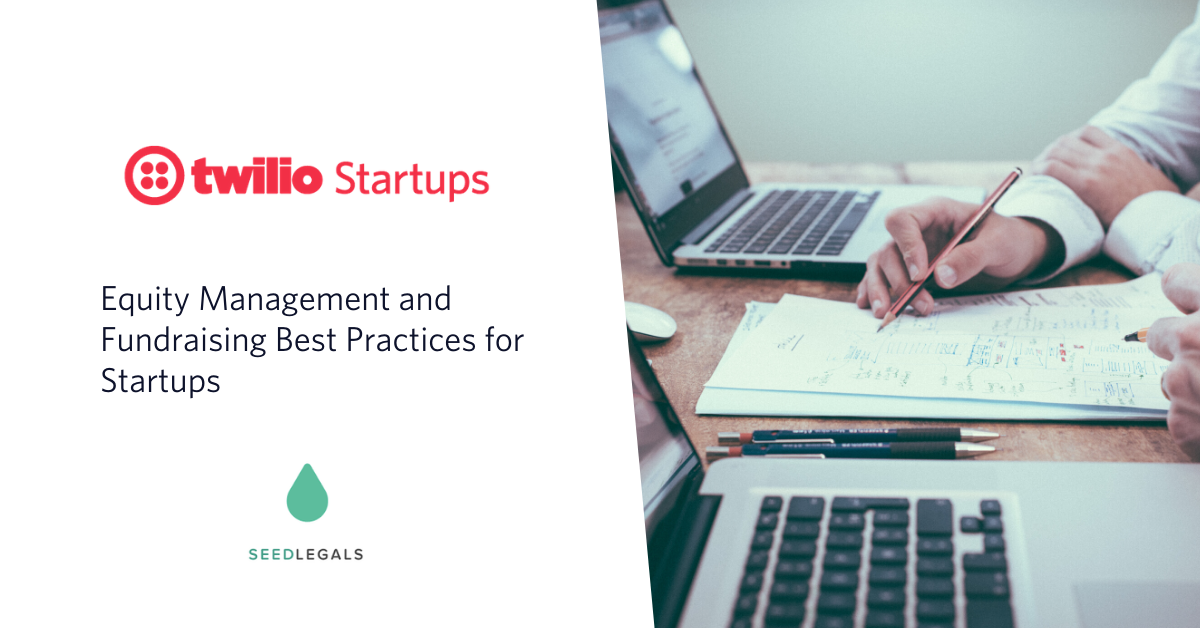Equity Management and Fundraising Best Practices for Startups with SeedLegals
Time to read: 3 minutes

At Twilio Startups, we work with our global partners to bring you the best advice for early-stage entrepreneurs. We reached out to Isabella Ghassemi-Smith, Ecosystem Developer at SeedLegals to talk about structuring your startup’s fundraising strategy, financing for entrepreneurs, and managing equity for early-stage founders.
SeedLegals is an automated legal platform that empowers founders and investors to easily create, negotiate, and sign all the legal docs they need for investment. They are the largest closer of funding rounds in the UK, with over 10,000 companies on the platform in two and a half years. Check out SeedLegal’s best practices for fundraising and managing equity for early-stage startups below.
SeedLegals Primer on Equity Fundraising for Startups
Isabella created a three-step primer for founders looking to understand equity management and fundraising best practices at a high level.
Why equity?
- It is easier to secure than finance from traditional institutional investors (i.e., banks). Equity capital carries no repayment obligation or legal personal liability in the same way as a loan does;
- On top of the working capital, equity investments give founders access to all of their investors' expertise. By securing 'smart investors' founders obtain sector-specific experience that is hugely beneficial to the business.
When to raise?
- Never raise too early because you have a less convincing proposition (market fit, traction, user base). Moreover, you can also attract fewer quality investors (who don't have domain expertise or network leverage to help your startup gain an unfair advantage), go through a lower quality round and potentially give away too much equity too early;
- Where you can grow organically and inexpensively, you should. An MVP doesn't have to be perfect, it just has to have your high expectation users and traction. This, in turn, enables you to see what you need/don't (i.e., product-market fit as opposed to an endless list of features that your users don't need or want). Rather than make assumptions which are irrelevant to the development of the startups and scaling your user base;
- Raising investment is not validation. If you don't need to raise, don't. If you can scale organically, you should. Raising should be to develop and scale, but it's not necessary. The investment climate is also beginning to shift, and the growth at all costs season is coming to an end. Startups need to factor sustainable growth and profitability as a key metric/indicator and what better way to do this than by developing and refining that approach to your business by growing organically for a period of time.
How to manage equity
- Keep that that Cap Table clean as so much depends on it. In the startup world, most things can be fixed. The nuance is that some things are very hard to undo once they are calcified. The Cap Table is one of those things – get it right, and it can have a positive impact. 30% of Cap Tables are wrong, so aligning your Cap Table with your company's house filings is important right from the start. You don't want to go through your first round and get the basic Cap Table wrong;
- On average, founders are giving away 15% per round. Your venture is worth much more than your first funding round. By giving away too much equity too early, you close yourself off to potential investment further down the line;
- Keep the Cap Table simple! Make your life easier. An unnecessarily complicated Cap Table leads to more and potentially expensive problems down the line;
- Ensure that when giving equity away, it's to investors/advisors who provide real value to the business, not just advice or intros.
If you are looking for more information on equity management and fundraising, please check out SeedLegals resources, including The 25 Step Guide to Completing Your First Funding Round from their founder Anthony Rose.
Ready to join Twilio Startups?
We hope you enjoyed this article featuring Isabella Ghassemi-Smith, Ecosystem Developer at SeedLegals about the startup fundraising process and managing equity as an early-stage founder.
This post has been created by the Twilio Startups Team. Check out more posts from the Twilio Startups team here.
You can apply to the Twilio Startups program here.
Interested in learning more about Twilio Startups? Email Frank Yaw-Owusu, Ecosystem Developer, EMEA at fyawowusu[at]twilio.com.
Related Posts
Related Resources
Twilio Docs
From APIs to SDKs to sample apps
API reference documentation, SDKs, helper libraries, quickstarts, and tutorials for your language and platform.
Resource Center
The latest ebooks, industry reports, and webinars
Learn from customer engagement experts to improve your own communication.
Ahoy
Twilio's developer community hub
Best practices, code samples, and inspiration to build communications and digital engagement experiences.


